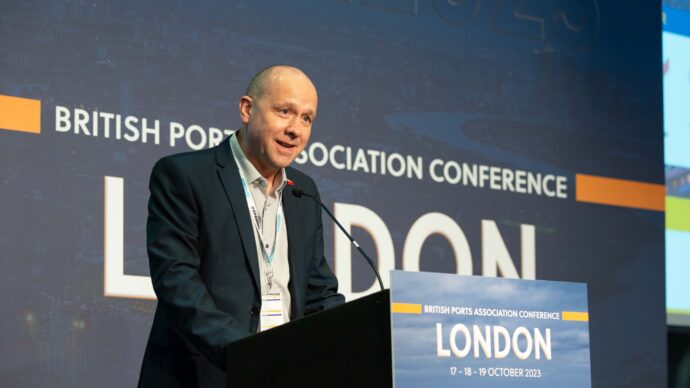NEWS
Safer Tomorrow thought leadership series: Mike Sellers
Campaigns |Published: Jun 18, 2025

In this third article in our PSS Safer Tomorrow series, Mike Sellers, CEO at Portsmouth International Port, reflects on over 30 years in the sector and what yesterday can tell us about tomorrow.
When thinking about what a safer port might look like tomorrow, Mike believes it’s important to first recognise how far the sector has come in the time he has worked within it.
“I remember a time when someone might sit on the back of a forklift to help counterbalance it while loading steel into a ship’s hold,” Mike said. “It’s unthinkable now, of course. Today, there’s a much stronger safety culture around ports. Like putting on a seatbelt when you get into a car, PPE is now second nature. But we still have more to do when it comes to human behaviour.”
“When I arrived at Portsmouth, health and safety didn’t feature on the board agenda. I believe it should be the first item — it shows what’s really going on in the port and ensures the board is actively engaged in addressing it.”
This shift in leadership focus, Mike says, must also guard against complacency to ensure that safety standards continue to improve.
“When you first start, you’re aware of the heavy machinery and pretty much terrified of everything going on,” he adds. “Then all of a sudden, you become familiar with your surroundings and your focus can drift.”
While toolbox talks have traditionally played a key role in keeping staff informed, Mike believes it’s time to embed safety deeper into organisational culture — ensuring that safety becomes part of the everyday, not just a scheduled conversation. This has been a key driver for Portsmouth International Port in recent years.
Technology
Mike believes that the AI revolution for ports has already begun and that better data analysis will help to highlight where efforts should be focussed to improve safety. He adds that technology must also be used to increase the potential to separate people and plant.
“There will always be more to do and better ways to be safer, but we’re never going to get to zero incidents because of the nature of the business. Most ports have evolved over hundreds of years, which means you often have offices located near particularly dangerous activities. Moving the people that don’t need to be in busy operational areas somewhere safer should be a priority, and it’s something we’re looking at here at Portsmouth.”
“The automation of ships is going to add a new dimension, but I think fully autonomous shipping is still at least 30 years away. As that develops, the mix of autonomous, semi-autonomous and fully manned ships will have implications for ports and the cultures within them.”
Mike sees opportunities in borrowing from the automotive industry to shape the next wave of safety improvements. For example, AI-enabled windscreens that detect nearby vehicles and hazards, apply the brakes automatically, and prevent lane drifting. He believes similar technology could be adapted for ports to reduce incidents.
Safety culture
A strong safety culture, Mike argues, will be the most decisive factor in achieving safer ports. And that culture must start from the top.
“As CEO, you must model the behaviours you expect from others, and ask the right questions. No one wants to be the CEO responding to a serious incident after the fact,” he says.
“It then takes the whole senior team to take it forward. All senior people must be visible around the port and refuse to walk past bad practices. This helps other staff, who may not feel confident to challenge unsafe behaviour immediately, to feel empowered to speak up.”
He adds that diversity plays a vital role in improving culture. An inclusive organisation made up of people from different backgrounds brings fresh perspectives that challenge convention and improve safety.
“Inclusivity is just as important as diversity. People need the confidence to speak up and trust that their input will be taken seriously. Everyone must be given the platform to contribute their insights and observations.”
Future skills
Looking to the future, Mike says the industry needs new skillsets to match emerging technologies.
“We need people that understand technology more. The port industry is full of traditional people like me who are shown new tech by their children! We need to bring in more tech-savvy people, as it’s going to play a big role in our future.”
“Automation will help make what we do safer, but it comes with its own demands. We need the right skillsets to support the tech, and I’m not sure we already have that in the port industry, so we’ll need to attract people from outside the sector.”
“Coming back to what will make a safer tomorrow, however technology changes the way ports operate, it comes back to how seriously ports take safety.”
“Being members of PSS, for example, it’s not just about ticking the box. It’s about sharing best practice, understanding the trends, and hearing what other ports are doing to address or minimise them. It’s proactively doing something which helps to create a safe environment and ensure your staff can go home safely every day.”
Conclusion
Mike Sellers’ reflections highlight that creating a safer tomorrow is not only about recognising how far the sector has come, but also about maintaining momentum. It’s a call to action for continuous improvement — embedding safety in leadership decisions, harnessing new technologies to reduce risk, and investing in the diverse skills needed for the future. Above all, it’s a reminder that culture is not static. A safer port tomorrow depends on the choices made today by those at every level, from the boardroom to the quayside.
